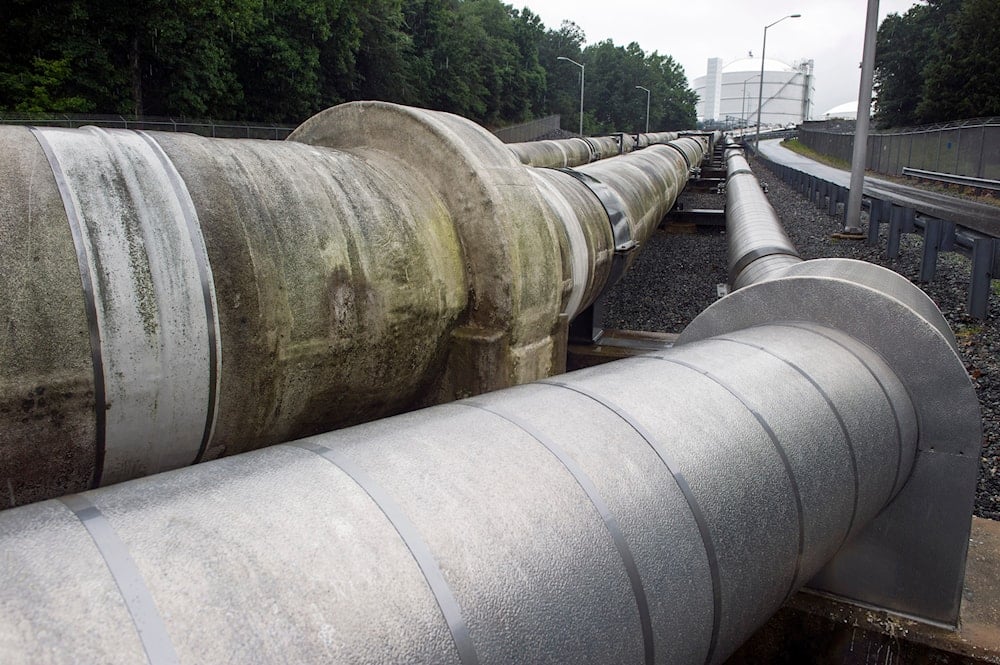All US LNG terminals broke pollution laws, report finds
A new Environmental Integrity Project report reveals that all US LNG terminals have violated pollution laws in recent years, despite industry claims of clean operations.
-

This photo, taken on June 12, 2014, shows transfer pipes carrying liquified natural gas to and from a holding tank, seen in the background, at Dominion Energy's Cove Point LNG Terminal in Lusby, Maryland. (AP)
A new report has revealed that every fully operational liquefied natural gas (LNG) terminal in the United States has violated federal environmental laws in recent years, casting doubt on the industry's claims of being environmentally responsible.
The analysis, based on public records, comes as the Trump administration fast-tracks the approval of new LNG export terminals to boost domestic exports to Europe and Asia. Ex-President Joe Biden had previously paused LNG export approvals, a measure Donald Trump reversed on his first day back in office.
The Environmental Integrity Project, a non-profit watchdog group, found widespread LNG terminal pollution violations, particularly under the Clean Air Act and Clean Water Act, across all seven currently operational terminals in the US.
“The LNG industry portrays itself as environmentally friendly, but companies do not consistently comply with air and water pollution control laws,” the report stated.
The United States has been the world's largest LNG exporter since 2023. As of late last year, seven export terminals were fully operational, three in Louisiana, two in Texas, and one each in Maryland and Georgia. From October 2022 to July 2025, all seven facilities were found to be in noncompliance with the Clean Air Act for at least one quarter, according to the report’s analysis of federal and state government data.
Five of the seven terminals were also cited for Clean Water Act violations, with four breaching regulations for at least two quarters between April 2022 and July 2025. Infractions ranged from illegal emissions of bacteria, zinc, oil, and other pollutants into waterways to terminal managers failing to file legally required monitoring reports.
One notable example is Cove Point LNG in Maryland, which holds an active wastewater permit but has not submitted discharge reports since 2017.
Most frequent offenders: Sabine Pass, Calcasieu Pass, and Freeport LNG
The Sabine Pass and Calcasieu Pass terminals in Cameron, Louisiana, have consistently failed to meet air quality standards, remaining out of compliance every quarter since 2022. Yet both terminals are moving ahead with plans for major expansion.
Texas’s Freeport LNG terminal, meanwhile, received the highest financial penalties after a major explosion in June 2022, which forced the facility to shut down for eight months. Regulators issued $493,804 in penalties following the blast, in addition to $175,800 in fines levied in the two years prior.
Despite their compliance records, several companies operating the most problematic terminals are seeking approval for new facilities and expansions.
Among them are:
- Venture Global, behind the Calcasieu Pass terminal, which has violated the Clean Air Act every quarter for three years and now plans to build two new LNG terminals in Louisiana.
- Cameron LNG and Sabine Pass, both requesting expansions despite 11–12 quarters of Clean Air Act violations.
- Corpus Christi LNG in Texas which has had nine water pollution violations over the past five years.
“The consequences of allowing Venture Global to build those could be devastating,” warned Anne Rolfes, Executive Director of the Louisiana Bucket Brigade.
Environmental and economic impacts of LNG export growth
Currently, four new LNG terminals are under construction, three in Texas and one in Louisiana, along with an expansion of the Elba Liquefaction terminal in Georgia. These projects alone are expected to increase US LNG export capacity by 60% annually.
In addition, companies have proposed 28 more projects, including 19 new terminals and nine expansions. These proposals raise serious concerns about public health, environmental protection, and long-term climate consequences.
The Environmental Integrity Project warns that this rapid growth not only puts communities at greater risk but also raises domestic gas prices. A Department of Energy study from the Biden era found that increasing LNG exports could boost natural gas prices in the US by more than 30%.
Despite claims by the fossil fuel industry that LNG is a cleaner alternative to coal, a major study last year found that exported LNG produces more greenhouse gas emissions than coal. “In a sane world, we would stop permitting any more gas export facilities right now, immediately,” said Rolfes.

 4 Min Read
4 Min Read










